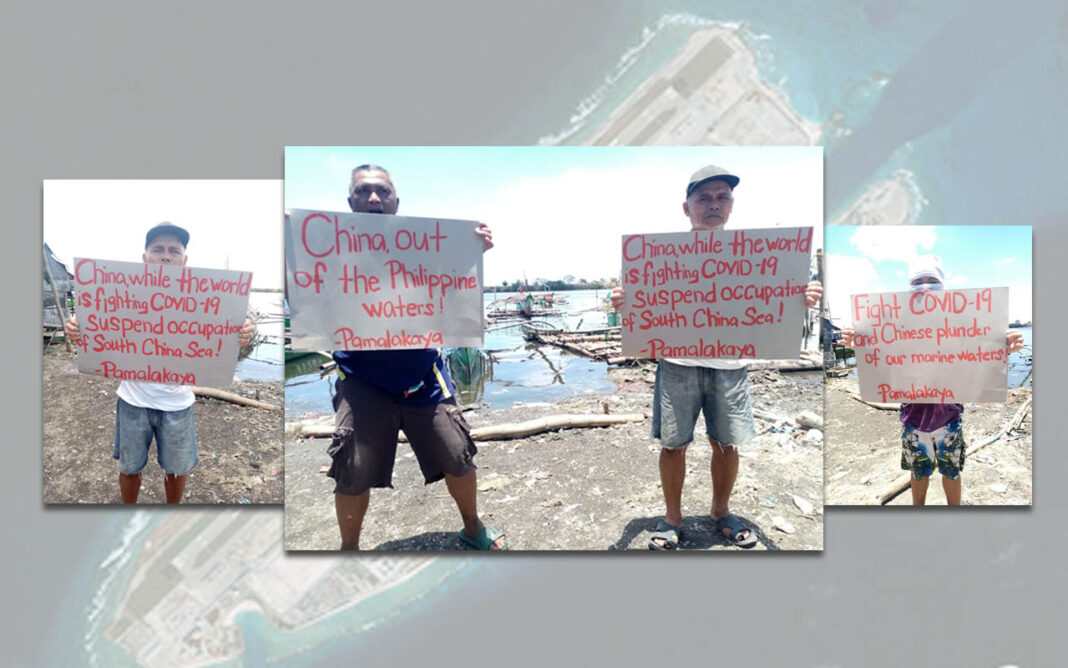In time of 50th anniversary of the Earth Day, the world faces “the two crises of the COVID-19 pandemic and slowly building disaster for our climate.” The Earth Day observances in the world, as in other occasions during the period where many countries are under lockdown, quarantine or ‘stay-at-home’ guidelines, went digital.
In the Philippines, various groups called for the protection of marine resources, banning reclamation and greening watersheds to take climate action and also to fight the COVID-19 pandemic. In the face of Chinese aggression in the West Philippine Sea even at this time and the lure of China money in loans and foreign investments for businesses and development projects, fighting for the country’s sovereignty may just as well be part of the climate solution.
Protecting marine resources
As the theme for Earth Day 2020 is climate action, fishers’ group PAMALAKAYA asserted the significance of protecting the West Philippine Sea, especially its marine resources, as China’s cost to coral reefs due to its reclamation activities is estimated at P33 billion per year.
The group added that at least 40, 000 acres of reefs were already destroyed in the course of Chinese reclamation, affecting not only the marine life, but also the livelihood of Filipino fisherfolk.
PAMALAKAYA slammed the recent developments of Chinese maritime aggression, including the construction of research stations in Kagitingan (Fiery Cross) and Zamora (Subi) reefs, both parts of the Spratly Islands in the West Philippine Sea.
The group tagged the continued developments of China in disputed waters and territories as ‘sheer opportunism’ as the world is reeling over the pandemic. On March 20, Xinhua reported that China launched two research stations on Fiery Cross (Kagitingan) and Subi Reefs in Spratly Islands, islands that China refers to as Yongshu and Zhubi.
“In the midst of a global health crisis caused by the pandemic, China has never ceased its expansion activities in the South China Sea. It deserves an international condemnation for taking advantage of the emergency situation to further its usurpation of marine territory,” Fernando Hicap, PAMALAKAYA National Chairperson said in a statement.
Vietnam also hit China after it announced that it would be setting up two administrative districts in the South China Sea – the Nansha District in Spratlys and Xisha District in Paracel Islands, where Vietnam has been upholding its sovereign claim.
No to Manila Bay reclamation
Nilad and Earth Island Institute on April 8 said they are “not amused by President Rodrigo Duterte’s statement that he is entertaining an option to approve reclamation projects in Manila Bay in order to raise resources in response to the COVID-19 pandemic.”
The groups proposed just the opposite—to scrap pending reclamation projects and rechannel the funds intended for social planning, demolition, and community preparation to the COVID-19 emergency budget.
During his April 6 televised address, Duterte made the following remarks: “Talagang ako handa akong ipagbili ‘yung buong Dewey Boulevard sa gustong mag-reclaim. Bigyan n’yo ako ng bigas, i-approve ko ‘yung — kasi hindi ako pumayag na mag-reclaim. Because a reclamation sa Manila Bay would trap sa environmentally — mag-collapse ang Manila.”
[I am ready to sell the whole Dewey Boulevard to anyone who wants to reclaim. Give me rice, I will approve it—because I did not approve reclamation [before]. Because a reclamation in Manila Bay would trap it environmentally—Manila will collapse.]
Nilad said that aside from causing irreversible damage on marine resources, it will displace coastal residents, and destroy the livelihoods of fisherfolk communities. While it will create jobs for new malls, hotels, and casinos, the social and environmental cost will far outweigh the intended benefits of selling coastal resources to the highest bidder.
“We cannot survive pandemics if we live in dirty habitats. Reclamation does not only pollute the waters, it represents an unsustainable model of development. We want to live in livable communities, and not in reclaimed lands,” said Nilad.
Greening watersheds
“Restoring watershed forests and rewilding urbanscapes are both immediate and long-term solutions to COVID-19 and future risks of pandemics. We will win half the battle against emerging infectious diseases if we live in sustainable environments and address the ecological imbalances such as water depletion, pollution, and climate disruption that will exacerbate the pandemic’s impacts,” said Leon Dulce, national coordinator of Kalikasan People’s Network for the Environment (Kalikasan PNE).
This observation was attributed to the idea that “environmental changes have a huge impact on the emergence and re-emergence of certain infectious diseases” echoed in one of Kalikasan PNE’s Earth Day 2020 webinars.
Former Ateneo School of Governance dean and former environment undersecretary Atty. Antonio La Vina said COVID-19 will not be our final pandemic if we continue with “business as usual—if our new normal includes mining, logging, pollution, coal power plants, all of the things which led to pandemics.”
“Large-scale miners like Chinese companies trying to haul mineral ores from Homonhon and Semirara Islands, and Australian-Canadian mining corporation Oceanagold that recently violently dispersed barricaders against its illegal and destructive operations, are direct threats to forests and public health alike,” stressed Dulce.
Dulce warned that the government should not use the COVID-19 crisis as justification for neglecting the protection of these ecosystems.





























